Learn about Black history and presence in Lane County and Oregon with these R-G stories
Black History Month 2022 begins Feb. 1, but The Register-Guard has been covering the legacy, accomplishments and resilient presence of Black community members of Lane County all year-round. Here are some the stories The R-G has published in the past year.
From 2021: 9 articles to revisit to learn about local Black history every month
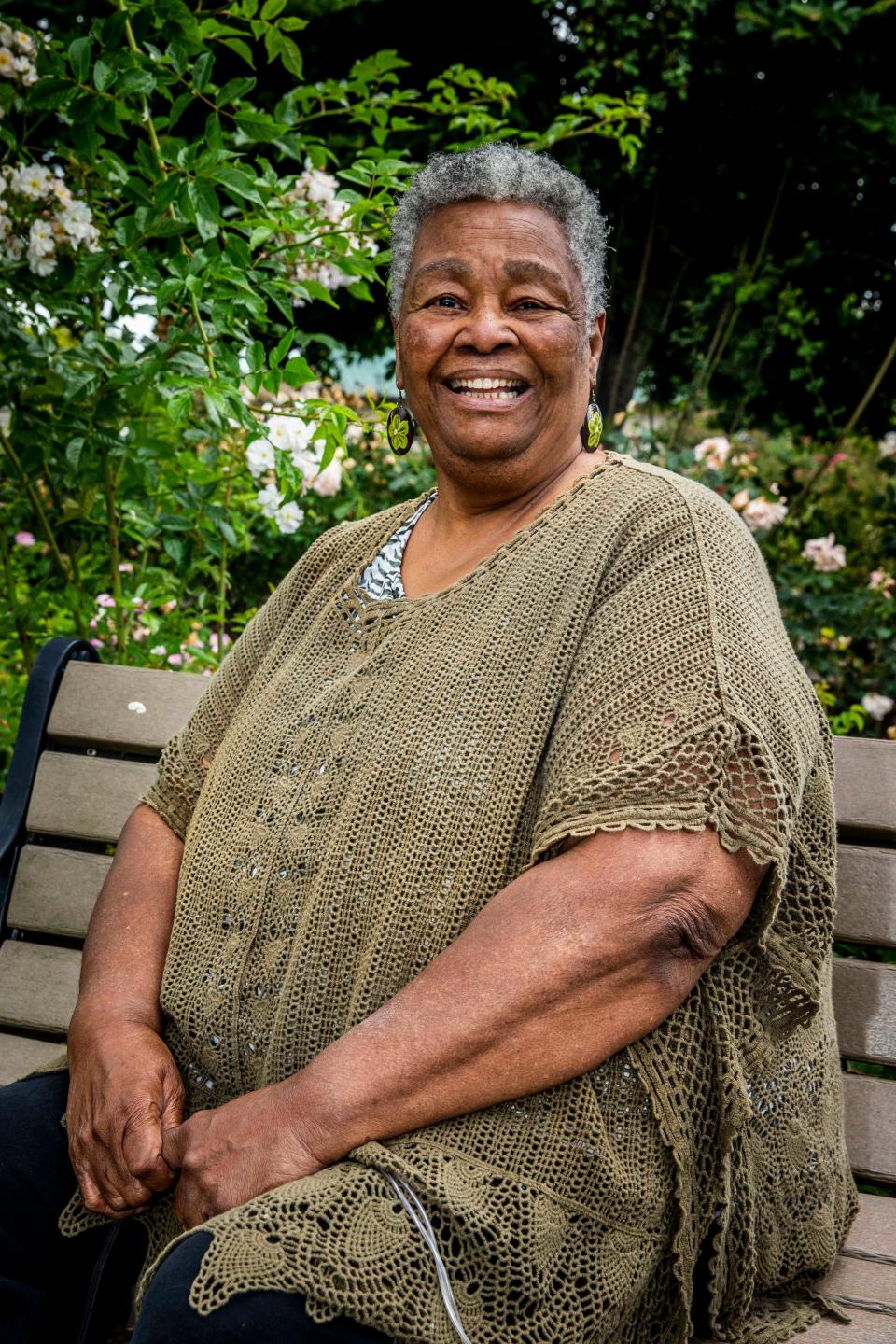
Students, community repay the kindness of a local Black elder
Since March, the fundraiser on the Facebook page titled “Thank You Ms. Lyllye” has raised more than $75,000. In the summer, the Eugene Emeralds baseball team held a fundraiser in Lyllye Reynolds-Parker's honor. Handmade vases from the Clay Mason Studio, filled with flowers from a friend's project, were raffled off to make money, as well. In the end, hundreds contributed. One donor gave $10,000. The youngest contributor was just 7 years old and gave $5.
Reynolds-Parker said she never expected a gift like this. Everything she gave, her students gave back.
"I'll tell you, the outcome was reciprocal. I am blessed. I am truly blessed. ... It just picks my heart up to know that not only did they trust me with that part of their life, but their parents trusted me," Reynolds-Parker said. "I wanted those students to know no matter what life throws at you, you are in control and somebody believes in you."
Read the story: She was a safe place for hundreds of UO students. Now she has a home of her own
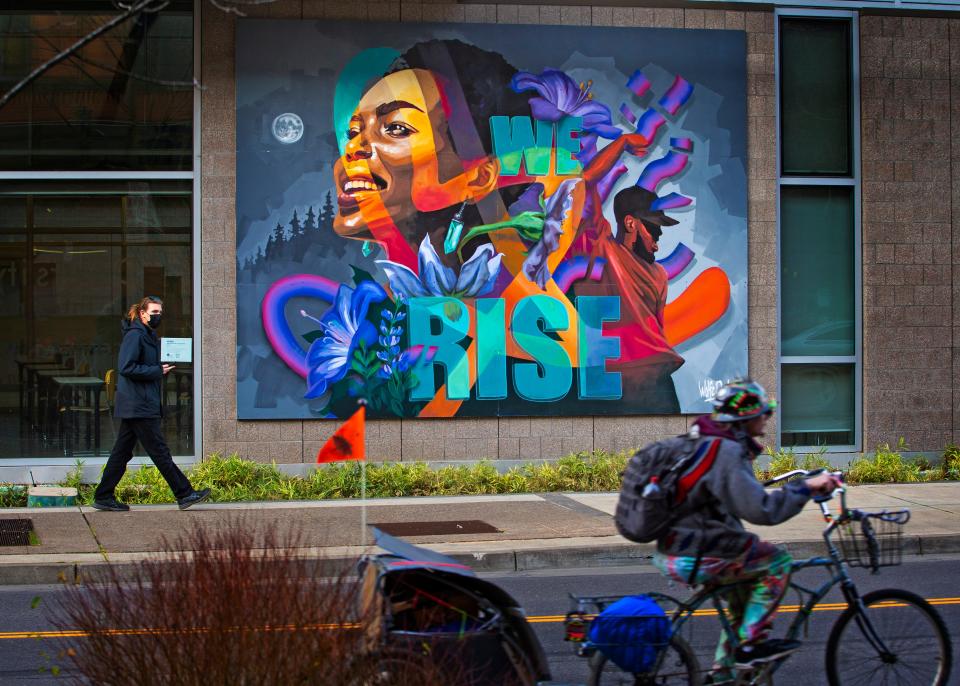
Leveraging art to bring young people of color together
A new mural now graces the side of a building in downtown Eugene just in time for Martin Luther King Jr. Day.
The project was the result of a partnership between the city of Eugene's Cultural Services division, Lane Community College and a committee of Black and African American youth brought together under a program called We Rise.
The 12-foot-by-16-foot piece was painted by artist Rachel Wolfe-Goldsmith, a Bay Area muralist who was raised in Eugene.
Read the story: In time for MLK Day, new mural in downtown Eugene a response to social justice moment
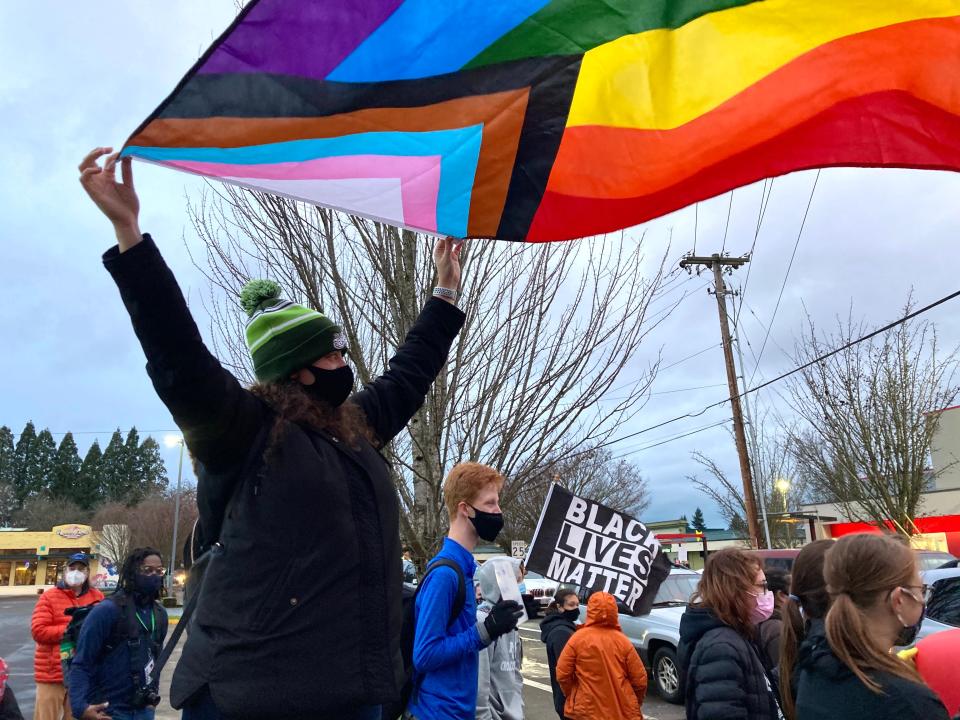
'No place for hate' in 4J schools
The Eugene School District and police responded to multiple incidents of hate speech and racism in schools occurring in December, prompting the district to draft a new policy that would create firm expectations for responses to racial harassment.
“I want to say clearly and unequivocally that bigoted and threatening speech has no place in our schools or our community,” Interim Superintendent Cydney Vandercar said at Wednesday’s board meeting. “Eugene School District 4J will not tolerate hateful words or actions, bigotry or any form of racist behavior in our classrooms, schools or on our grounds. There's simply no place for it.”
But more than a year after the peak of Black Lives Matter protests in the community calling attention to rampant racism, some say this type of response is overdue.
Read the story: Eugene 4J teachers, students respond to incidents of hate speech
What are local schools doing to teach students to be anti-racist?
When people rose up against the murder of George Floyd and other Black Americans killed by police, it reignited a racial justice movement in Oregon and across the world with calls for change in every corner of our communities.
Schools were specifically challenged for perpetuating racism through whitewashed and incomplete histories and were called on to play a new role: to teach the next generation to be anti-racist.
Many local schools during the protests acknowledged the continued presence of racism and pledged against it, saying they would “do the work” to confront it in schools and listen more to their students of color. But a year later, with few exceptions, many changes have only appeared in long-term policy reviews or promises without immediate change, causing some to wonder whether they will follow through.
Read the story: Local schools pledged anti-racism last year, but are they following through?
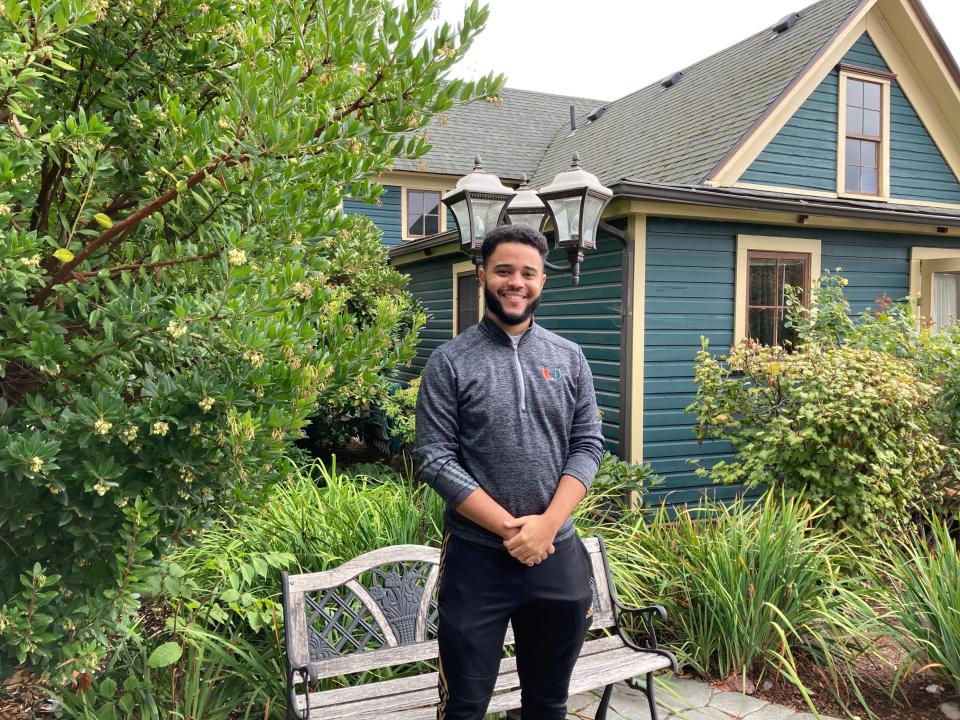
A new leader at the Eugene Springfield NAACP
Miles Rowe Pendleton, who grew up in Eugene and recently graduated from the University of Miami, began his role Sept. 1 as president of the Eugene Springfield NAACP. He will serve in the role until December 2022, after which he looks forward to going back to school to pursue law.
Pendleton said he enjoys basketball, football, baseball and connecting with his community. He sat down with The Register-Guard to introduce himself and discuss his role.
Read the story: New Eugene Springfield NAACP president returns to Eugene motivated and inspired

A rapper's Pulitzer-winning music isn't part of the curriculum. Here's why that matters
North Eugene High School's curriculum gained attention regarding the music by rapper Kendrick Lamar not being included this year, prompting questions from some people in the community about whether 4J's curriculum is culturally relevant and inclusive of Black students' experiences.
Lamar's album "DAMN." won the 2018 Pulitzer Prize for storytelling that reflected the complex experience of Black life in America. He also has won 13 Grammy Awards and been nominated 37 times.
The concerns around the curriculum have prompted protests, comments from then-school board candidate Maya Rabasa and personal essays about racism. It also has opened up a broader conversation about what it means to teach Black history and culture.
Read the story: Lamar's music ignites broader conversation about Eugene schools' Black culture curriculum
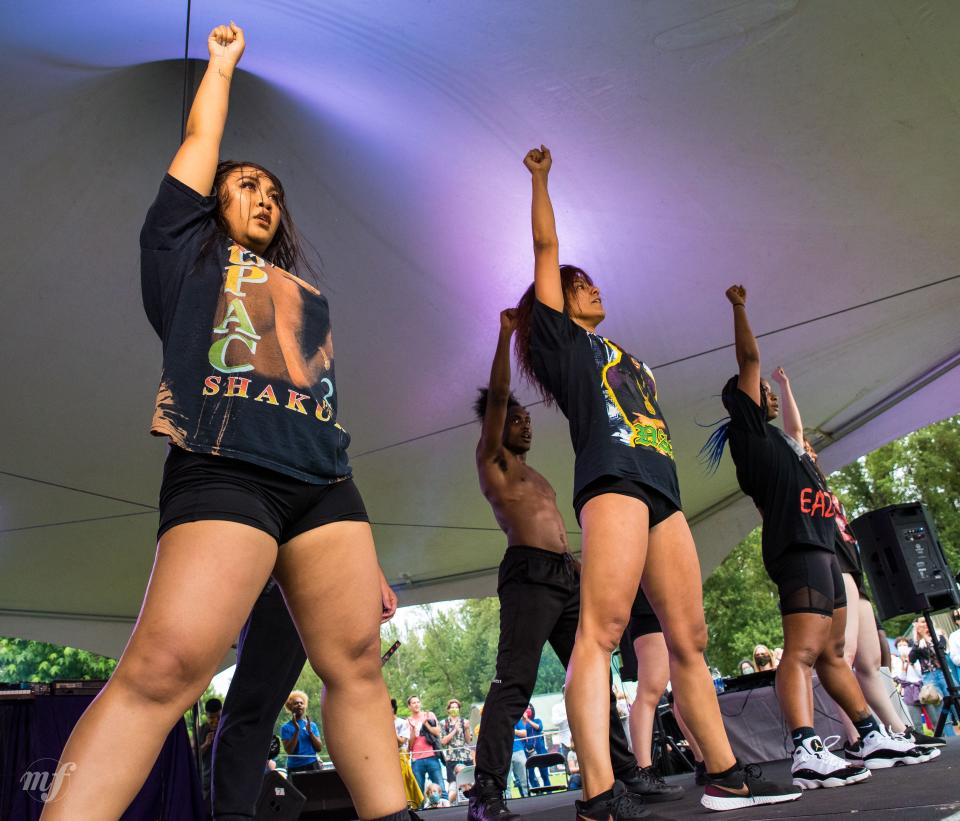
A Juneteenth celebration in Eugene turned 'trauma into joy'
In 2021, the Black Led Action Coalition (B.L.A.C.), Honoring Our New Ethnic Youth (H.O.N.E.Y.) and Xcape Dance Company banded together with local leaders to bring arts, education and participating speakers for the city’s second “Official Juneteenth Celebration.”
“We all need to know our places that we came from,” Xcape Academy dancer (and owner) Vanessa Fuller said. “One of the things that's really important in educating our younger kids and families is focusing on Black joy and Black excellence.”
Read the story: Juneteenth and Black culture rise in Eugene again, seeking to 'turn trauma into joy'
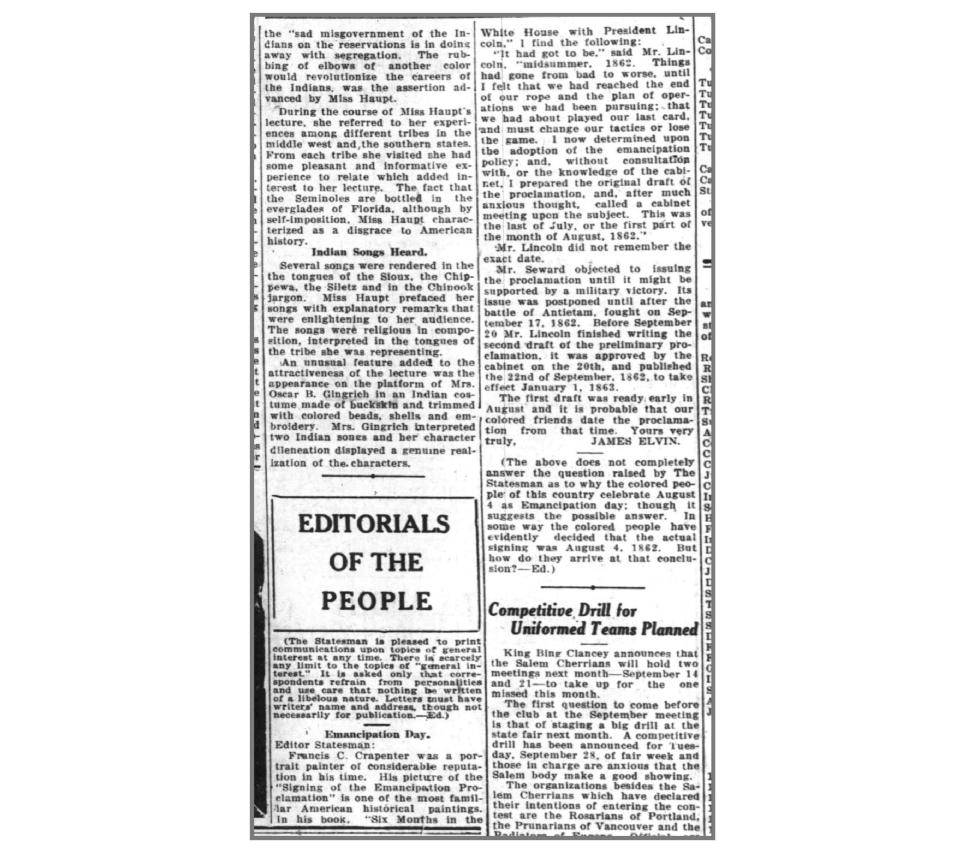
Learn more about Oregon's racist history — and emancipation celebrations
On June 19, 1865, enslaved people in Galveston, Texas, received the news about President Abraham Lincoln's Emancipation Proclamation, which had freed enslaved African Americans in rebel states two and a half years earlier.
President Joe Biden last year signed legislation into law making the day, known as Juneteenth, a federal holiday every year. The day is also known as Freedom Day or Emancipation Day. There are 47 states that already observe the date in some manner. Texas was the first to officially recognize Juneteenth as a state holiday, in 1980.
Oregon's celebration of Juneteenth has grown more popular in recent years, but celebrations of Emancipation Day are documented since the 1860s, including gatherings among early Black Oregonians who witnessed the state's racist history.
Read the story: Despite Oregon's racist history, state emancipation celebrations date back to 1860s
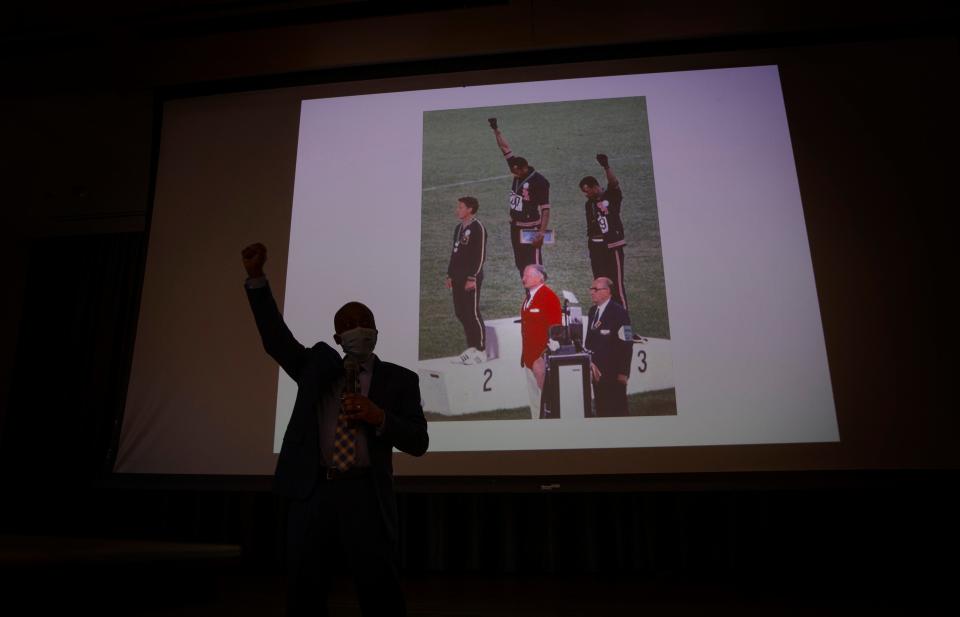
Malcom Frierson is teaching the 'African experience' at UO
Malcolm Frierson wants his students to laugh.
Of course, the historian and visiting University of Oregon assistant professor wants his classes to be empowering, enriching and challenging — but he also wants them to be laugh-out-loud funny.
The content of his classes ranges widely, but emphasizes stories of Black success, innovation and joy, in part to counter simplistic narratives that reduce the African American experience to violence, poverty and misery.
Read the story: Comedy intersects with Black history for visiting UO assistant professor Malcolm Frierson
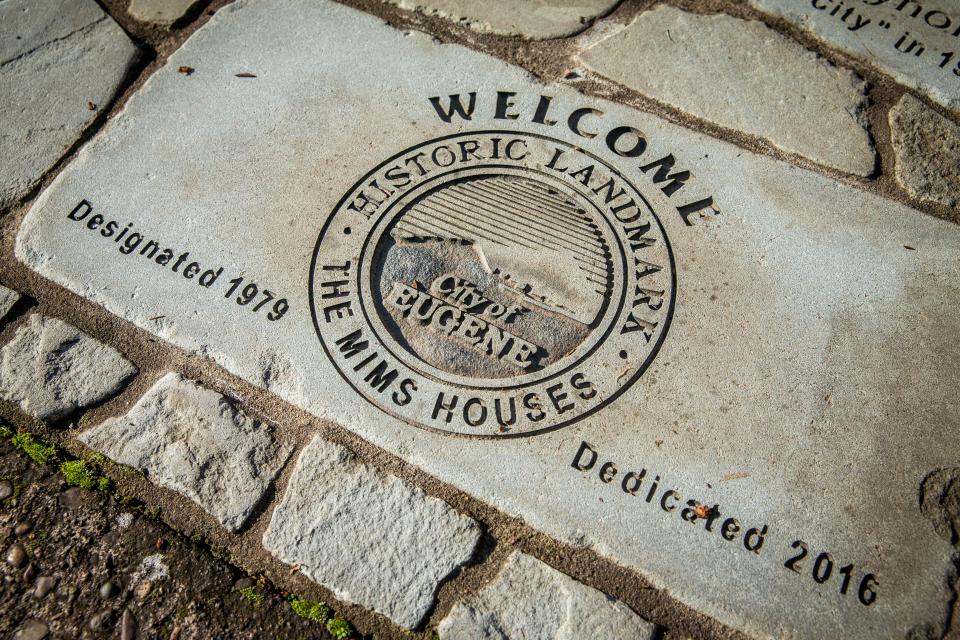
More ways to learn about local Black history
Library at the Mims House
Located at 330 High St., the Mims House is one of the oldest structures in Eugene. It’s owned by the Mims family and leased by the local NAACP chapter for community gatherings, meetings and storage. During the 1940s, laws forbid African Americans from living within Eugene’s city limits, so the Mims family lived on the north bank of the Willamette River in what now is Alton Baker Park. The location was outside the city at the time.
The historic Mims House is home to the local chapter of the NAACP as well as a free library that is open to the public.
Historic sites walking tour
Strides for Social Justice — a recently launched project from PeaceHealth and Eugene Marathon — is a free, family-friendly app that guides participants on routes to various landmarks, "creating a journey that provides a view into local Black history and the powerful influence of Black residents in our community," according to the program's website.
Strides for Social Justice added two routes on Feb. 1 focused on firsts in athletics and academics by Black UO students, coaches, faculty and staff
You can download the app on iOS and Android.
Visit Lane County's Black-owned business directory
The county compiled a list of local Black-owned businesses ranging from clothing, food, spas, automotive care and legal services, available on its website.
Why is February Black History Month?
Carter G. Woodson, known as the “Father of Black History,” developed Black History Month.
Woodson, whose parents were enslaved, was an author, historian and the second African American to earn a doctorate at Harvard University.
He recognized that the American education system offered very little information about the accomplishments of African Americans and founded the Association for the Study of Negro Life and History, now called the Association for the Study of African American Life and History. In 1926, Woodson proposed a national “Negro History Week." Woodson chose the second week of February to coincide with the birthdays of Frederick Douglass, a famed abolitionist who escaped from slavery, and President Abraham Lincoln, who formally abolished slavery.
It wasn't until 1976, during the height of the civil rights movement, that President Gerald Ford expanded the week into Black History Month.
Learn more: Why is Black History Month in February? How do you celebrate? Everything you need to know.
Suggested reading
Looking for a suggested reading list this month? Here are some suggestions from Register-Guard staff members (in alphabetical order):
"The 1619 Project" by Nikole Hannah-Jones
"The 1619 Project: Born on the Water" by Nikole Hannah-Jones and Renee Watson
"And the Category Is ...: Inside New York's Vogue, House, and Ballroom Community" by Ricky Tucker
"Call Us What We Carry" by Amanda Gorman
"Caste: The Origins of Our Discontents" by Isabel Wilkerson
"Colorization: One Hundred Years of Black Film in a White World" by Wil Haygood
"The Devil You Know: A Black Power Manifesto" by Charles Blow
"Four Hundred Souls: A Community History of African America, 1619-2019" by by Ibram X. Kendi and Keisha N. Blain
"Get a Life, Chloe Brown" by Talia Hibbert
"A Little Devil in America: In Praise of Black Performance" by Hanif Abdurraqib
"Punch Me Up to the Gods" by Brian Broome
"Seven Days in June" by Tia Williams
"Such a Fun Age" by Kiley Reid
N'dea Yancey-Bragg of USA TODAY contributed to this report.
Want more stories like this? Subscribe to get unlimited access and support local journalism.
This article originally appeared on Register-Guard: These R-G stories sought to tell the Black experience in Lane County

